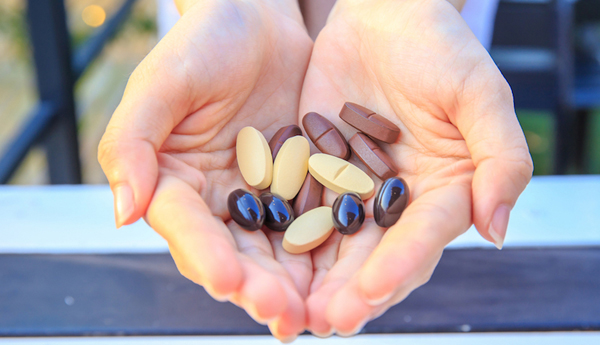On one side of the story, you may have heard Multivitamins being touted as a wonder drug, helping everything from weight loss to living longer. Yet, on the other side of the debate, there are some physicians warn about potential risks. In the most extreme example, “anti-multi” experts warn about the potential dangers of toxicity. Or that multivitamins are a waste of money and you’re simply paying for “expensive pee”.
With such a polarizing debate, who do you believe and what do you do? We’re showing you some top highlights from the evidence and sharing our personal experiences with supplementation below! By the time you’ve finished reading this, you’ll be much more empowered to decide what’s best for you!
A Note From Our Personal Story
Our interest in supplementation was piqued very early in our Food Matters journey.
Before the Food Matters film was even conceived of, Laurentine and I were traveling the world, interviewing health experts who could give the answers we needed to help my father. My father had been sick for five years with debilitating depression, anxiety, chronic fatigue syndrome and fibromyalgia, with no hope of recovery offered by the medical profession.
A recurring theme that kept coming up during these interviews was the role of vitamin therapy and supplementation. At first, this seemed kind of anti-intuitive and ‘unnatural’. But as we learned, sometimes when the body is so severely nutrient depleted and out of balance, supplementation can play a very big role in restoring wellness.
The Food Matters film describes this in great detail but needless to say, we witnessed first-hand how powerful supplementation can truly be, especially when the body is in a state of disease. We rolled out a supplementation plan very carefully, under medical supervision and with integrated practitioners. And boy, aren’t we glad we did! (My father fully recovered and continues to be in vibrant health today.)
As for ourselves, Laurentine and I continue to supplement daily. We use high-quality supplements and soon notice the difference when we skip a few days! It’s our personal health insurance.
These words from Mark Hyman, MD, mirror our views nicely:
“(You don’t need a supplement) ONLY if you eat wild, fresh, whole, organic, local, non-genetically modified food grown in virgin mineral and nutrient soils, and not transported across vast distances and stored for months before eaten . . . work and live outside, breathe only fresh unpolluted air, drink only pure, clean water, sleep nine hours a night, move your body every day,and are free from chronic stressors and exposures to environmental toxins.”
A Background On Multivitamins
A multivitamin is a supplement that’s intended to supply our most essential vitamins and minerals. This convenient capsule contains the key nutrients that our body needs to sustain life, maintain health and perform everyday functions.
Vitamins are a bit like the ‘worker bees’ of our physiological systems. They work as coenzymes to facilitate the metabolic processes involved in protecting DNA, making energy, repairing cellular damage and so much more!
It appears that people are concerned about getting enough vitamins; one third of Americans are currently taking a multivitamin. Seventy percent of these people are aged 65 years or older and contribute to the annual multivitamin bill of $12 billion!
The Pro’s Of Taking Multivitamins
One major argument usually used in favor of multivitamins is that they help to seal the nutritional gaps in our diet.
As the very name ‘supplement’ suggests, the intention of a multivitamin is to supplement these gaps, rather than replace the role of whole foods in providing our primary nutrition.
Some research shows that vitamin and mineral supplementation may provide some protection against conditions which are associated with chronic nutrient deficiencies. These benefits may include:
-
Better energy
-
Clearer skin
-
Anti-aging
-
Enhanced memory
-
Lower risk of nutritional deficiencies
-
Maintenance of muscle strength
-
Stronger bones
-
Less stress
-
Increased sexual function
-
Superior cognitive functioning
A supplement is not intended as a whole food replacement, but multivitamins can top up the missing nutrients that even the healthiest of modern diets may be lacking.
Because Food Isn’t Made The Way It Used To Be!
The fruit and vegetables our great-grandparents ate were waaaaaay more nutrient-dense than the food we get today!
Why? Industrialized farming methods have stripped our soil of critical nutrients. Crops grown in your Grandfather’s time were, therefore, more nutrient-dense than the fresh produce we eat today.
One study showed how significant this difference really is! Check out the nutrient declines which were measured in fresh vegetables from 1975 to 1997:
-
Calcium – 12%
-
Vitamin A – 21%
-
Iron – 37%
-
Vitamin C – 30%
So even if you’re doing your best to eat a healthy, well-balanced diet, there’s still a good chance that you may not be getting the 40+ nutrients we require on a daily basis!
In particular, the 2010 Dietary Guidelines for Americans highlighted that fiber, potassium, vitamin D and calcium specifically carry a high risk for deficiency in the US population
In light of all this evidence, both the Linus Pauling Institute’s Micronutrient Information Center at Oregon State University and the Harvard School of Public Health have released recommendations to take a daily multivitamin.
The Potential Con’s Of Taking Multivitamins
The arguments against using multivitamins tend to fit within a couple of categories.
Firstly, in addition to the vitamins, minerals and macronutrients that have been well-studied, food is filled with thousands of other phytochemicals. Experts have pointed out that the role of these bioactive compounds is not completely known and that a pill cannot hope to mimic the natural composition of food.
Other researchers have also reported conflicting findings which claim multivitamins don’t protect against chronic disease, cognitive decline, and aging. Other people also claim that some multivitamins may cause toxicity in high doses.
Should I Take A Multivitamin?
There are certain red flags that highlight an extra need to take a supplement:
-
Is your diet a little less than healthy? (This could also be due to travel or a recent illness that affected your appetite.)
-
Do you diet or eat restrictively for other reasons? When we cut our calorie intake we also reduce our potential for getting essential nutrients.
-
Do you avoid whole food groups? (For example grains/gluten, dairy, meat.) This also potentially alters your nutrient intake.
If you belong at one of these at-risk group for vitamin or mineral deficiencies, then a daily multivitamin may be a good insurance policy for your health.
What To Look For In A Multivitamin
Here are some key things to consider when choosing a multivitamin:
-
Which biochemical form of the vitamins and minerals does this supplement provide? (Ideally, you want the most bioavailable forms.)
-
What dose does the supplement provide? Some brands have been known to supply sub-clinical doses. On the other hand, certain nutrients are also toxic at high doses, so read the label carefully.
-
Is this supplement from a company that has a good reputation and is known to manufacture high-quality vitamins?
-
Where is your vitamin sourced from? Now, there are some instances when high doses of synthetic vitamins is perfectly acceptable– perhaps even essential – to address clinically and critically low nutrient deficiencies. Therefore, at Food Matters we are not against all synthetic supplements, particularly if they are high quality, super bioavailable and serve a specific therapeutic purpose. However, we still recommend checking where your supplement is coming from and why. A perfect example is fish oil; is it sourced from farmed fish with potential mercury contamination?
-
Cost. This is a bit of a generalization but cheaper multivitamins are more likely to contain fillers, preservatives, artificial colors and other additives. Read the label carefully and do your research before selecting cheaper brands.



